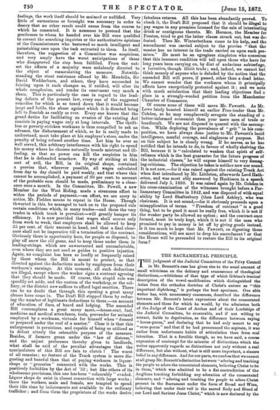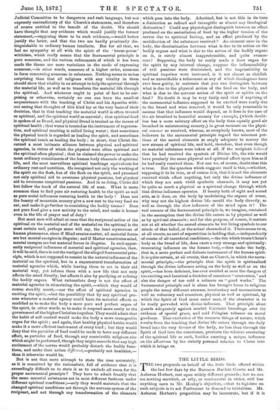THE SACRAMENTAL PRINCIPLE.
THE judgment of the Judicial Committee of the Privy Council in Mr. Bennett's case has given rise to the usual amount of small witticisms on the delicacy and evanescence of theological distinctions,—witticisms of that type of which Gibbon's ironical description of the vowel-modification which distinguished the Arian from the orthodox doctrine of Christ's nature as "this important diphthong," is perhaps the best specimen. One able writer has, with unnecessary coarseness, described the difference between Mr. Bennett's latest expressions about the consecrated elements and those for which he would, by the admission both of the Judge of the Court of Arches and of their Lordships of the Judicial Committee, be censurable, and if not willing to retract, liable to deprivation, as the difference between saying "hocus-pocus," and declaring that he had only meant to say " ocus-pocus " and that if he had pronounced the aspirate, it was rather from unfortunate habits of articulation than from real intention. That is a forcible though, as we have said, a coarse expression of contempt for the minutiw of distinctions which the writer apparently regards as distinctions not only without a real difference, but also without, what is still more important, a sincere belief in any difference. And for our parts, we confess that we cannot at all grasp Mr. Bennett's distinction between "adoring and teaching the people to adore the consecrated elements, believing Christ to be in them," which was admitted to be a flat contradiction of the Anglican teaching forbidding any adoration of the consecrated elements, and "adoring and teaching the people to adore Christ present in the Sacrament under the form of Bread and Wine, believing that under their veil is the sacred Body and Blood of our Lord and Saviour Jesus Christ," which is now declared by the
Judicial Committee to be dangerous and rash language, but not expressly contradictory of the Church's statements, and therefore of course entitled to the benefit of the doubt. We should have thought that any evidence which would justify the former statement,—supposing there to be such evidence,—would better justify the latter, and that the two are hardly practically dis- tinguishable to ordinary human intellects. But for all that, we feel no sympathy at all with the spirit of the ' hocus-pocus ' witticism, which really means that the Sacramental principle is pure nonsense, and the various refinements of which it has been made the theme are mere variations in the mode of expressing nonsense,—in other words, nonsense of a higher order, nonsense in form concerning nonsense in substance. Nothing seems to us less surprising than that all religions with any vitality in them should show that vitality in an attempt to help the spiritual through the material life, as well as to transform the material life through the spiritual. And whatever ought in point of fact to be sur- prising or otherwise, certainly no one can have the smallest acquaintance with the teaching of Christ and his Apostles with- out seeing that thoughts of this kind lay at the very basis of their doctrine, that in that teaching the material world is often treated as spiritual, and the spiritual world as material ; that spiritual food is spoken of as Bread, and physical Bread is treated as the means of spiritual health ; that water is treated as the instrument of regenera- tion, and spiritual teaching is called living water ; that sometimes the physical touch is regarded as healing the spirit, and sometimes the spiritual touch as healing the body ; in short, that Christ dis- cerned a most intimate alliance between physical and spiritual agencies, in virtue of which the physical were often spiritual and the spiritual often physical ; that he claimed the power to make the most ordinary constituents of the human body channels of spiritual life, and the most marvellous spiritual teachings equivalents for ordinary rest and nutrition. He recognised not only the working of the spirit on the flesh, but of the flesh on the spirit, and promised not only spiritual aid to overcome physical passions, but physical aid to overcome unspiritual passions. And in so doing, Christ did but follow the track of the natural life of man. What is more common than to find pure air restoring health to the spirit as well as pure social influences restoring health to the body ? Does not the beauty of mountain scenery give a new zest to the very food we eat, and make it go further in nourishing the bodily tissues? Does not pure food give a new activity to the mind, and make it keener even in the life of prayer and of duty?
But most men will admit at once that the reciprocal action of the spiritual on the material and of the material on the spiritual is the most certain and, perhaps some will say, the least mysterious of human phenomena, since if Mind creates matter, all material forces are but mental energies in disguise; and if Matter constitutes mind, mental energies are but material forces in disguise. In such appar- ently reciprocal influences of material and spiritual agencies, then, it will be said, there is not the vestige of the alleged Sacramental prin- ciple, which is not supposed to consist in the natural influence of the material on the spiritual, but in a supernatural transformation of material agencies which, while leaving them to act in their old material way, yet infuses them with a new life that not only affects the mind directly, but affects it also by purifying or refining the bodily organs. What rationalists deny is not the effect of material agencies in stimulating the spirit,—which they would of course steadily assert,—nor the effect of spiritual agencies in exciting the spirit, —but the possibility that by any spiritual pro- cess whatever a material agency could have its material effects so modified as to make the body a more pure and perfect organ of the spirit, in other words, as to make it respond more easily to the government of the higher Christian impulses. They would admit that the habit of self-control would make the body a more manageable organ for the spirit ; and again, that healthy physical habits would make it a more efficient instrument of every kind ; but they would deny that the particles of food could be made to have any different effect, as particles of food, through any conceivable religious rite which might be performed, though they might concede that any high excitement of the nerves would probably disturb the bodily func- tions, and make their action different,—probably not healthier,— than it otherwise would be.
But is not that mere attempt to state the case accurately, as it is conceived by the rationalists, full of evidence that it is exceedingly difficult so to state it as to exclude all room for the proper sacramental principle ? They have to admit frankly that the same material substances act in most different fashions under different spiritual conditions ;—only they would main tam that the changed spiritual conditions act through the nervous system of the recipient, and not through any transformation of the elements which pass into the body. Admitted, but is not this in its tarn a distinction as refined and intangible as almost any theological distinction? Could any physiologist distinguish between an effect produced on the assimilation of food by the higher tension of the nerves due to spiritual feeling, and an effect produced' by the modification of the substance received ? An element once in the body, the discrimination between what is due to its action on the bodily organs and what is due to the action of the bodily organs on it, is surely almost inapprehensible, and quite evanes- cent? Supposing the body be really made a finer organ for the spirit by any internal change, suppose the inflammability of evil passions were diminished, and the impressibility to spiritual impulses were increased, is it not almost as childish and as unverifiable a refinement as any of which theologians have ever been guilty, to maintain that you can distinguish between what is due to the physical action of the food on the body, and what is due to the nervous action of the spirit or spirits on the food ? No doubt it may be very fairly said that if anything of the sacramental influence supposed to be exerted were really due to the bread and wine received, it would be only reasonable to assume that that influence would depend, as it does iu the case of the air breathed in beautiful scenery for example, (which doubt- less has a more salutary effect on the body than equally good air breathed in uninteresting scenery,) in great measure on the physi- cal amount so received, whereas, as everybody knows, most of the believers in the sacramental principle regard the minutest por- tions of the sacred elements as amply adequate to convey the new stream of spiritual life, and hold, therefore, that even though no material substance were taken at all, if the recipient believed that he had received the symbols of Divine life, the rite would have precisely the same physical and spiritual effect upon him as if he had really received them. Nor can we, of course, doubt that this is true. But the question which suggests itself is this,—whether, supposing it to be true, as of course it is, that it is not the elements received which effect anything, but only the divine influence of which they are such vivid symbolic channels, it may not yet be quite as much a physical as a spiritual change through which that divine influence operates. If beauty both of eight and sound acts, as it does, on the body by modulating the organs of sense, why may not the highest divine life mould the body directly, as well as through the slow influence of the mind upon it? The real essence of the Sacramental principle is, we imagine, contained in the assumption that the divine life enters us by physical as well as by spiritual channels ; and for this purpose, of course, it matters not at all whether the sacred elements be but living symbols to our minds of that belief, or the actual channels of it. There seems to us, at all events, no sort of superstition in holding that,—independently of course of all sacerdotal conditions,—the rite which treats Christ's body as the bread of life, does exert a very strange and spiritually- reuovating influence on the human body,—does make the body, that is, a more perfect and delicate instrument of the human spirit. It is quite certain, at all events, that no Church, in which the sacra- mental principle,—the principle that the spirit is spiritualised through the divine influence acting on the body as well as on the spirit,—has been deficient, has ever avoided at once the dangers of too exciting and fanatical a doctrine of conscious "conversion," and also the danger of too cold a reliance on "good works." The Sacramental principle and it alone has brought home to religious people the many different avenues, involuntary and unconscious as well as voluntary and conscious, physical as well as spiritual, by which the Spirit of God must enter man, if the character is to be really pervaded with divine influence. That principle alone guards adequately against morbid Calvinist broodings over the evidence of special grace, and cold Pelagian reliance on moral goodness. That exaltation of the common things of nature, which results from the teaching that divine life enters through the daily bread into the very tissues of the body, no less than through the Spirit of God into the conscience, prevents the relative overrating of the spiritual life as such, besides exerting a unique influence on the affections by the strictly personal relation to Christ into which it brings us.



































 Previous page
Previous page